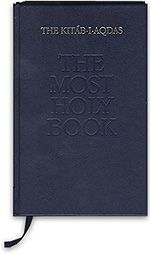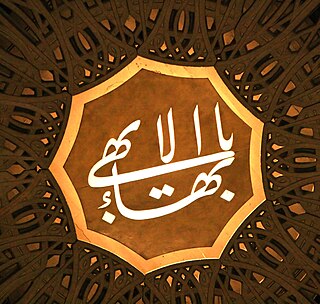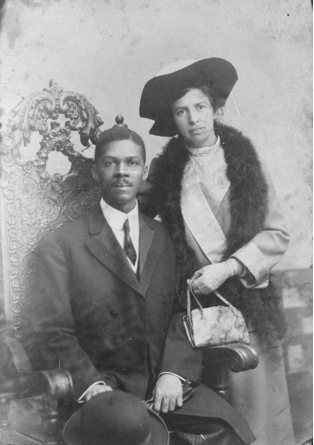
The Kitáb-i-Aqdas is the central religious text of the Baháʼí Faith, written by Baháʼu'lláh, the founder of the religion, in 1873. Though it is the main source of Baháʼí laws and practices, much of the content deals with other matters, like foundational principles of the religion, the establishment of Baháʼí institutions, mysticism, ethics, social principles, and prophecies. In Baháʼí literature it is described as "the Mother-Book" of the Baháʼí teachings, and the "Charter of the future world civilization".

The Universal House of Justice is the nine-member supreme ruling body of the Baháʼí Faith. It was envisioned by Baháʼu'lláh, the founder of the Baháʼí Faith, as an institution that could legislate on issues not already addressed in the Baháʼí writings, providing flexibility for the Baháʼí Faith to adapt to changing conditions. It was first elected in 1963, and subsequently every five years, by delegates consisting of the members of Baháʼí National Spiritual Assemblies throughout the world.
Riḍván is a twelve-day festival in the Bahá'í Faith commemorating Bahá'u'lláh's declaration that he was a Manifestation of God. In the Bahá'í calendar, it begins at sunset on the 13th of Jalál, which translates to the 20th or 21 April, depending on the date of the March equinox. In 2024, it begins in the evening of 19 April. On the first, ninth and twelfth days of Ridván, work and school should be suspended.

Mírzá Muhammad ʻAlí was the second surviving son of Baháʼu'lláh, the founder of the Baháʼí Faith, and the first from Baháʼu'lláh's second wife Fatimih. He is well-known for an attempted schism in which he claimed leadership over his half-brother ʻAbdu'l-Bahá, and was rejected by the overwhelming majority of Baháʼís, who regard him as a Covenant-breaker. The only result of his unsuccessful leadership attempt was to alienate most of the family of Baháʼu'lláh from ʻAbdu'l-Bahá. His schism was short lived and no longer exists; by the 1960s his descendants had largely melded into Muslim society and had no collective religious life.
Baháʼu'lláh was the founder of the Baháʼí Faith. He was born in 1817 to Khadíjih Khánum and Mírzá Buzurg of Nur, a Persian nobleman, and went on to be a leader in the Bábí movement, and then established the Baháʼí Faith in 1863. Baháʼu'lláh's family consists of his three wives and the children of those wives.

The Baháʼí World Centre buildings are buildings that are part of the Baháʼí World Centre in Israel. The Baháʼí World Centre buildings include both the Baháʼí holy places used for pilgrimage and the international administrative bodies of the Baháʼí Faith; they comprise more than 20 different administrative offices, pilgrim buildings, libraries, archives, historical residences, and shrines. These structures are all set amidst more than 30 different gardens or individual terraces.

In the Baháʼí Faith there are two covenants, deemed the 'greater' and 'lesser'. The greater covenant refers to an agreement of progressive revelation: that God will send messengers about every thousand years, and it is humanity's duty to recognize them and respond to their teachings. The lesser covenant is the agreement between the faith's founder, Baháʼu'lláh, and his followers, regarding the succession of leadership and the maintenance of unity.
Spiritual Assembly is a term given by ʻAbdu'l-Bahá to refer to elected councils that govern the Baháʼí Faith. Because the Baháʼí Faith has no clergy, they carry out the affairs of the community. In addition to existing at the local level, there are national Spiritual Assemblies. Spiritual Assemblies form part of the elected branch of the Baháʼí administration.
Baháʼí laws are laws and ordinances used in the Baháʼí Faith and are a fundamental part of Baháʼí practice. The laws are based on authenticated texts from Baháʼu'lláh, the founder of the Baháʼí Faith, and also includes subsequent interpretations from ʻAbdu'l-Bahá and Shoghi Effendi, and legislation by the Universal House of Justice. Baháʼí law is presented as a set of general principles and guidelines and individuals must apply them as they best seem fit. While some of the social laws are enforced by Baháʼí institutions, the emphasis is placed on individuals following the laws based on their conscience, understanding and reasoning, and Baháʼís are expected to follow the laws for the love of Baháʼu'lláh. The laws are seen as the method of the maintenance of order and security in the world.

Baháʼí marriage is union of a man and a woman. Its purpose is mainly spiritual and is to foster harmony, fellowship and unity between the two partners. The Baháʼí teachings on marriage call it a fortress for well-being and salvation and place marriage and the family as the foundation of the structure of human society.

A Baháʼí pilgrimage currently consists of visiting the holy places in Acre and Haifa at the Baháʼí World Centre in Northwest Israel. Baháʼís do not have access to other places designated as sites for pilgrimage.

The Tablets of Baháʼu'lláh Revealed After the Kitáb-i-Aqdas are selected tablets written by Baháʼu'lláh, the founder of the Baháʼí Faith, and published together as of 1978. The current edition bears the title Fountain of Wisdom: A Collection of Writings from Baháʼu'lláh.
The Apostles of Baháʼu'lláh were nineteen prominent followers of Baháʼu'lláh, the founder of the Baháʼí Faith. The apostles were designated as such by Shoghi Effendi, head of the religion in the earlier half of the 20th century, and the list was included in The Baháʼí World, Vol. III (pp. 80–81).
Baháʼí literature covers a variety of topics and forms, including scripture and inspiration, interpretation, history and biography, introduction and study materials, and apologia. Sometimes considerable overlap between these forms can be observed in a particular text.
Adherents of the Baháʼí Faith observe a sunrise-to-sunset fast for nineteen days every March. The practice is regarded as one of the most significant obligations of a Baháʼí, along with daily obligatory prayers. There are several exemptions to the fast, such as pregnancy or illness, and it only applies to those 15 to 70 years old.
Gleanings from the Writings of Baháʼu'lláh is a compilation of selected tablets and extracts from tablets by Baháʼu'lláh, the founder of the Baháʼí Faith. Shoghi Effendi, Guardian of the Baháʼí Faith from 1921 to 1957, made the selection and performed the translation, which was first published in 1935.

The Birth of Baháʼu'lláh is one of nine holy days in the Baháʼí calendar that is celebrated by adherents of the Baháʼí Faith and during which work is suspended. The holy day celebrates the birth of Baháʼu'lláh, the founder of the Baháʼí Faith. The 2024 date is November 3.
There are two types of prayer in the Baháʼí Faith: obligatory prayer and general or devotional prayer. Both types of prayer are composed of reverent words which are addressed to God, and the act of prayer is one of the most important Baháʼí laws for individual discipline. The purpose of prayer in the Baháʼí Faith is to grow closer to God and his Manifestation and to help better one's own conduct and to request divine assistance.
The following outline is provided as an overview of and topical guide to the Baháʼí Faith.
The Festivals of the Twin Birthdays or the Twin Holy Birthdays refers to two successive holy days in the Baháʼí calendar that celebrate the births of two central figures of the Baháʼí Faith. The two holy days are the birth of the Báb on the first day of Muharram in the Islamic calendar and the birth of Baháʼu'lláh on the second day of Muharram.









